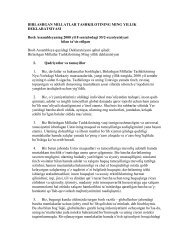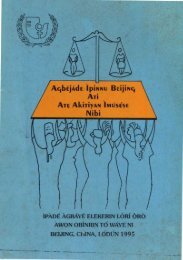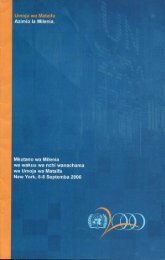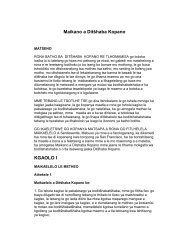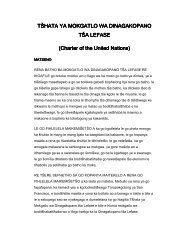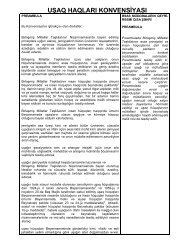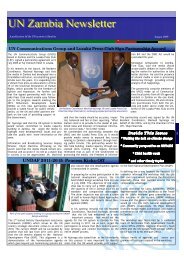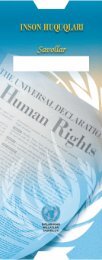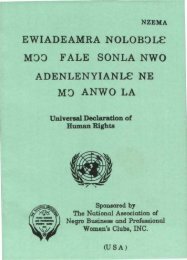Download Newsletter - United Nations Information Centres
Download Newsletter - United Nations Information Centres
Download Newsletter - United Nations Information Centres
Create successful ePaper yourself
Turn your PDF publications into a flip-book with our unique Google optimized e-Paper software.
VOLUME 37 AUGUST, 2011<br />
Efforts to boost 'Third<br />
Gender' rights in Nepal<br />
KATHMANDU, 9 August — On 21<br />
December 2007, the Supreme<br />
Court of Nepal rendered a landmark<br />
decision in ordering the<br />
Government to amend all<br />
discriminatory laws against LGBTI<br />
(Lesbian, Gay, Bisexual,<br />
Transgender and Intersex) and<br />
formally recognize the LGBTI as<br />
‗third gender‘ in accordance with<br />
their sexual and gender identities.<br />
The objective of this decision was<br />
to protect the rights of these<br />
individuals and communities on an<br />
equal footing with heterosexual<br />
citizens and most importantly<br />
extend all available state services<br />
to LGBTI with specific reference to<br />
citizenship certificates - a<br />
prerequisite for accessing many<br />
other state services and rights!<br />
UNDP Nepal has been managing<br />
HIV and AIDS programming at the<br />
national level by channeling two big<br />
funds i.e. the global fund round 7<br />
grant and DFID funding. The LGBTI<br />
community is supported particularly<br />
because this sexual minority is<br />
more vulnerable to sexually<br />
transmitted infection (STI) and HIV.<br />
The head of DFID (former) in Nepal<br />
Sarah Sanyahumbi said, ―DFID‘s<br />
programme in Nepal is going to<br />
increase dramatically in the next 4<br />
years and health is going to remain<br />
a major priority ensuring that all the<br />
minority groups have access to<br />
health facilities. We want to ensure<br />
that HIV AIDS support is taken on<br />
UN <strong>Information</strong> Centre Kathmandu<br />
board by the Government, we have<br />
been supporting primarily through<br />
UNDP so far. But we see it as a<br />
key element of the Government‘s<br />
health provision so we want to<br />
make sure that the Government<br />
takes that on in full with donor<br />
support and UK certainly will<br />
continue that support.‖<br />
UNDP was the first international<br />
entity to extend support to the Blue<br />
Diamond Society (BDS) in social<br />
mobilization, and HIV and STI<br />
intervention which<br />
includesprevention, VCT, treatment<br />
services, peer education, outreach,<br />
behaviour change communication<br />
(BCC)and counselling services in<br />
14 districts of Nepal.<br />
Efforts are also underway for the<br />
amendment of discriminatory laws<br />
and policies and the implementation<br />
of the 2007 decision of the<br />
Supreme Court of Nepal.<br />
UNDP Country Director for Nepal,<br />
Shoko Noda says, ―Nepal is a<br />
pioneer in South Asia for making<br />
this landmark decision however the<br />
challenge now is to fully implement<br />
it in action.‖<br />
Besides, UNDP in Nepal has been<br />
working closely with the National<br />
Association of PLHIV Nepal<br />
(NAP+N)—working for the<br />
advocacy on rights of People Living<br />
With HIV, Recovering Nepal (RN)—<br />
working on HIV advocacy for the<br />
rights of IDUs, Nepal HIV AIDS<br />
UN n e w s l e t t e r<br />
N e p a l<br />
Alliance (NEHA)— working for<br />
advocacy on mainstreaming HIV/<br />
AIDS in multiple sectors and Jagriti<br />
Mahila Samuha (JMS)— working<br />
for advocacy on the rights of female<br />
sex workers.<br />
As a result of all the efforts, the<br />
Government of Nepal has extended<br />
some degree of legal protection and<br />
financial support for LGBTI issues.<br />
With rising advocacy and<br />
awareness, recently the Central<br />
Bureau of Statistics listed ‗third<br />
gender‘ in its census form, and the<br />
Election Commission included<br />
similar wording in the voter<br />
registration forms.<br />
There has been an increased social<br />
acceptance, reduction in<br />
harassment by the authorities/<br />
police; and legal recognition of their<br />
identity. The non-governmental and<br />
private actors, including the<br />
National Human Rights<br />
Commission of Nepal and the<br />
Nepal Investment Bank have<br />
reoriented institutional policies to<br />
include, ‗others‘ as a gender.<br />
Further, LGBTI issues are being<br />
taught within State universities<br />
while regular sympathetic media<br />
and television coverage has served<br />
to sensitize the public at large.<br />
www.un.org.np, kathmandu.unic.org<br />
UNITED NATIONS IN NEPAL<br />
19



